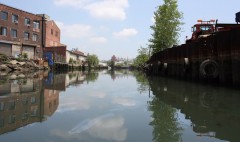04.10.12
:: Latest Developments :: Indian Point
The Atomic Safety and Licensing Board denied a contention to the relicensing of Indian Point that Riverkeeper and our partner organization, Hudson River Sloop Clearwater, filed in August, 2011.
Learn More
03.30.12
:: Latest Developments :: Stop Polluters
After more than a decade of fighting to preserve and protect the waters and fishery of Upper Esopus Creek, in January 2011, Riverkeeper joined with our partner organizations, citizens, and local officials in the effort to address the muddy waters of the Lower Esopus, which historically has supported other diverse fisheries and a variety of recreational activities.
Learn More
03.15.12
:: Latest Developments :: Indian Point
Since the devastating accident at the Fukushima nuclear power plant one year ago, Entergy spokespeople have been quick to make unsubstantiated claims about how “it can’t happen here.” Such public distortions include misleading statements about whether Entergy could avoid large-scale radiological releases from Indian Point during an accident. As described below in an article written by Mark Leyse, there is much cause for concern about whether the build-up of hydrogen during an accident could be managed at Indian Point in order to avoid harmful explosions that could expose the public […]
Learn More
03.13.12
:: Latest Developments :: Stop Polluters
New York City waters will soon be safer for swimming and fishing, thanks to a new agreement between city and state leaders that Riverkeeper and its partners helped shape.
Learn More
03.09.12
:: Latest Developments :: Indian Point
A year ago on March 11, an earthquake and tsunami triggered a nuclear disaster at Japan’s Fukushima Daiichi nuclear power plant, leading to the evacuation of 160,000 people, a 12-mile exclusion zone around the crippled plant, and an ongoing crisis.
Learn More
01.09.12
:: Latest Developments :: Contaminated Sites
Following last year’s investigation, the Environmental Protection Agency has proposed cleanup options for the Gowanus Canal that would finally give Brooklyn residents their waterway back.
Learn More
11.09.11
:: Latest Developments :: Indian Point
To continue to operate its Indian Point nuclear reactors on the Hudson River 35 miles from Midtown Manhattan, Entergy needs a water quality certificate from New York State.
Learn More
10.19.11
:: Latest Developments :: Stop Polluters

design and photo credit NYC Parks Dept Jeff Keiter
Riverkeeper, like New York City and the New York State Department of Environmental Conservation (DEC), is dedicated to improving water quality by reducing the levels of sewage pollution in the waters surrounding New York City. We applaud the state and the city’s decision to formally incorporate Green Infrastructure into the city’s long term plans to reduce Combined Sewer Overflows (CSO), which result in nearly 30 billion gallons a year of untreated sewage being discharged into the Hudson, Harlem and East Rivers and New York Harbor annually.
Learn More
10.19.11
:: Latest Developments :: Power Plant Cases
October 17 kicked off the start of administrative hearings in Albany that are critical to the fate of the Indian Point nuclear power plant. These hearings were initiated by the owner of the plant, Entergy, to dispute the New York State Department of Environmental Conservation’s (DEC) landmark denial in April 2010 of a critical and necessary Water Quality Certification for the plant. Without the water quality certification, Indian Point can’t receive a renewed operating license.
Learn More
10.17.11
:: Latest Developments :: Indian Point
A new report prepared for riverkeeper and Natural Resources Defense Council (NRDC) by energy consulting firm Synapse Energy Economics, finds there is currently a surplus of electricity capacity in the regions near Indian Point, including New York City, and that even if the Indian Point units were closed when their current operating licenses expire by 2015, there would be no need for new electric capacity to meet reliability requirements until 2020.
Learn More








